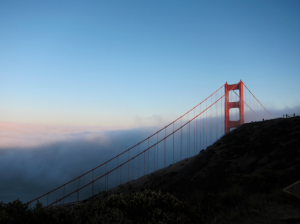 Sebastian went to California for graduate school. He came to the United States because of their reputation as a leader in higher education. “The best schools for the graduate studies that I wanted to do were in the United States. So I applied to the schools in the United States and I got in, and I then stayed here. But at the time I just wanted to go to graduate school.” He settled in Northern California, the San Francisco bay area. He didn’t have any sort of social network in the area. “I knew some people that moved to the United States around the same time as I did. We had just graduated college, and we moved to the United States to work or to get a graduate degree. But all different cities. I was the only one in California of the people I knew. There were some in Chicago…One in Princeton. And that was it. In California I didn’t know anybody.” He studied Operations research which he laughingly calls, “a conversation stopper. It was applied mathematics to engineering and other types of models.” He knew English because he “had studied English in Argentina in school.” He went to a British school and had a strong grasp of the language. He tells me, “I felt very welcome. I didn’t feel any differences being made between American students and foreign students. It was very open. I quickly became a T.A.” He also became a research assistant. He discusses that those jobs, “partly paid for my education.” I ask him about his initial impression of the United States. He smiles and said the he found the country to be a “very organized place. ” When Sebastian arrived, “there was a drought in California. One of my professors from Israel came to the same school at the same time as I did. It was his sabbatical in the United States, and I came for graduate school. So we would get together and chat, and we thought it was really funny that during a drought the big deal was not watering the lawn and flushing every second time in the public bathrooms. We thought that there was no consciousness of what a drought really was, [having lived] in Israel where you live actually in a desert, we were somewhat more conscious of the value of water.” After living here for many decades now, he has different impressions of the country, “I think it’s a good country, but it has its issues. Indecisive on many international matters that are clear-cut in my view, and very political in domestic matters that should be resolved. A country as rich as this one should not have worse health care then third world countries in South America.”
Sebastian went to California for graduate school. He came to the United States because of their reputation as a leader in higher education. “The best schools for the graduate studies that I wanted to do were in the United States. So I applied to the schools in the United States and I got in, and I then stayed here. But at the time I just wanted to go to graduate school.” He settled in Northern California, the San Francisco bay area. He didn’t have any sort of social network in the area. “I knew some people that moved to the United States around the same time as I did. We had just graduated college, and we moved to the United States to work or to get a graduate degree. But all different cities. I was the only one in California of the people I knew. There were some in Chicago…One in Princeton. And that was it. In California I didn’t know anybody.” He studied Operations research which he laughingly calls, “a conversation stopper. It was applied mathematics to engineering and other types of models.” He knew English because he “had studied English in Argentina in school.” He went to a British school and had a strong grasp of the language. He tells me, “I felt very welcome. I didn’t feel any differences being made between American students and foreign students. It was very open. I quickly became a T.A.” He also became a research assistant. He discusses that those jobs, “partly paid for my education.” I ask him about his initial impression of the United States. He smiles and said the he found the country to be a “very organized place. ” When Sebastian arrived, “there was a drought in California. One of my professors from Israel came to the same school at the same time as I did. It was his sabbatical in the United States, and I came for graduate school. So we would get together and chat, and we thought it was really funny that during a drought the big deal was not watering the lawn and flushing every second time in the public bathrooms. We thought that there was no consciousness of what a drought really was, [having lived] in Israel where you live actually in a desert, we were somewhat more conscious of the value of water.” After living here for many decades now, he has different impressions of the country, “I think it’s a good country, but it has its issues. Indecisive on many international matters that are clear-cut in my view, and very political in domestic matters that should be resolved. A country as rich as this one should not have worse health care then third world countries in South America.”
In Sebastian’s last year in graduate school he “got a job as a consultant in a financial modeling company.” He stayed with that company post graduation, and they arranged for his citizenship. He tells me, “one of my clients in New York offered me a job and I left the place where I was working and came to work in New York.” It was in New York that he met his wife, raised his children, and still lives today.

